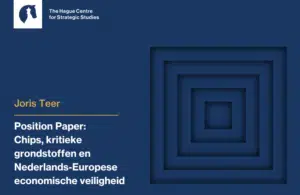New Event | Emerging Technologies and the Future of Deterrence
Emerging and disruptive technologies (EDTs) such as AI, (counter-)space, cyber, directed energy weapons, electronic warfare and hypersonic missiles increasingly affect international security and strategic stability. At this event - part of the NATO Summit Tour - a distinguished panel of international experts will present different viewpoints on the impact of emerging technologies on deterrence and strategic stability.
Interview with Lieutenant Colonel Ainar Afanasjev on The Baltic Defence Line
On January 15, 2025 HCSS had the honour to host the Dutch Minister of Defence and his 3 his three colleagues from Estonia, Latvia, and Lithuania as well 3 defence experts from the visiting Allies. HCSS Strategic Analyst Davis Ellison briefly spoke to one of the military panelists, Lieutenant Colonel Ainar Afanasjev from the Estonain Defence Forces just after the event. They discussed preparedness during peace time, Estonian preparations, coordination efforts between the three Baltic states, lessons learned from the Ukrainian armed forces and being ready for new threats. Watch the full interview here.
Dr. Tim Sweijs interviews four Defence Ministers during ‘The Baltic Defence Line’ Symposium
On 15 January 2025, HCSS was honoured to welcome the Dutch Minister of Defence Mr. Ruben Brekelmans and his three colleagues from Estonia, Latvia, and Lithuania: Defence Ministers Mr. Hanno Pevkur, Mr. Andris Sprūds and Ms. Dovilė Šakalienė. The four ministers gathered for 'The Baltic Defence Line' Symposium to discuss the topic of eastern flank defence, NATO’s forward defence strategy in Europe, and the ongoing Russian invasion of Ukraine. Just before HCSS hosted this event, Dr. Tim Sweijs managed to briefly interview the 4 defence ministers.



















